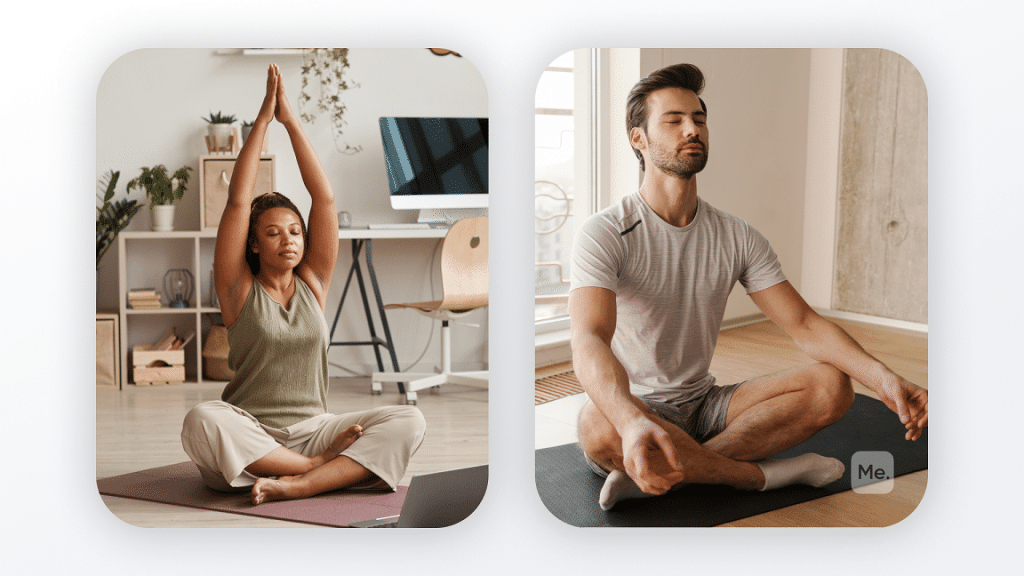Have you ever loved and cared for someone? Most likely yes, because affection is not only about enjoying romantic vibes with your partner. It entails emotional attachment between people.
Picture this, you’re discussing an artistic masterpiece with your teacher whose words gently resonate with your personal opinion. You enjoy fruitful communication and start liking this person with no sexual thoughts whatsoever.
The point is, that whenever we feel heard, seen, and understood we tend to become fond of this person automatically.
Affection is this feeling of fondness you may have for your family member, caregiver, friend, co-worker, teacher, or spouse.
Let’s dig deeper into this topic and learn about the 5 universal types of affection in a relationship.
Are there different types of affection?
The American Psychological Association describes affection as a feeling of fondness, tenderness, and liking, especially when nonsexual (2).
You start receiving affection when you’re a baby. Your parents give you affection to make you feel safe and loved. Your partner may give you a Stiff Neck Massage to make you relaxed and perhaps make you aroused for a frisky erotic journey.
There are different types of affection people use for certain purposes. Let’s look at the 5 most popular types of affection. I’m sure you have gone through at least two of them in your life.
- Familial Affection
- Platonic Affection
- Romantic Affection
- Agape: UnconditionalAffection
- Realitas Affection
Familial Affection
Yes, that’s exactly what you imagine: you gain affection from your family members. Unfortunately, not everyone gets this positive experience. Parents may be too aggressive or condescending, which induces anger, frustration, or sadness in their children.
Familial affection is really important as the world seems to be a strange place for you and the only people you can rely on are your close relatives.
Platonic Affection
Have you ever had a friend you adored spending time with? You enjoy a real connection, and relish a lot of fun moments, but still haven’t felt anything sexual. If yes, you are on the path of Platonic affection. It’s named after the philosopher Plato and it entails feeling nonsexual affection towards our relatives, friends, teachers, or other people in our lives.
There may be situations when people misinterpret this affection with a romantic one especially when we’re talking about friendship between men and women.
Romantic Affection
Among all types of affection, a romantic one is the most “soap-opera-like”: you feel a special connection intermixed with chemistry. This might have happened to you too. You find a person attractive, sexy, and smart. Your feelings of passion, physical attraction, and intense longing lead to sleepless nights and contact thoughts.
Romantic affection is one of the most powerful types of emotional affection. However, there are also cases when romantic affection leads directly to sexual interaction and romantic dates.
Something tells us you often forget to put all the everyday hustle and bustle on hold and simply concentrate on yourself. It’s time to straighten out your priorities! Take a moment to heal, process your emotions, ground yourself, release all the pent-up tension and recharge with the BetterMe: Meditation & Sleep app before getting back into the race of life!
Agape: Unconditional Affection
No other types of showing affection are as selfless and altruistic as agape affection. People who express agape usually get more pleasure from giving than receiving and place the other person’s needs and desires above their own.
Ramp up your agape affection through empathic listening, where there is no room for judgment about what the other person is saying. Instead, you unconditionally accept and respect that person without expecting anything in return. Yet, this type of affection can be tricky and can become unhealthy when someone who is showing unconditional love, does not receive the same mutual care and respect in the relationship.. Moreover, when someone mistreats you or engages in abusive behavior, persistently offering unconditional love to that individual can have detrimental effects. Therefore, unconditional love requires reciprocity.
Realitas Affection
A real type of affection with no pretense or idealism. It’s accurate, truthful, and factual, in contrast to made-up fantasies in the person’s head. Compared to other types of affection towards someone you already struggle with pet peeves connected to this person: their clothing choice, manners, their goals, etc. but still maintain good relationships with them.
Because realitas affection fosters the acceptance of things the way they are, opposed to idealistic versions of them. We all require moments of truth in our lives because life is not always perfect. It’s important to have someone who can ground us in reality when we’re in love, and we should be willing to accept both the positive and negative aspects of life to a certain extent.
A good example of realitas affection could be when you dislike the music your friend is listening to but don’t mind dancing to it at his birthday party.
What are the 5 examples of affection?
The best way to describe 5 examples of affection is to look at the 5 love languages. You’ve probably heard of the 5 types of love languages that make up healthy and sustainable relationships.
Gary Chapman collected them in his book “The 5 Love Languages” in 1992 (5).
- Words of affirmation – you express your love via kind words, praise, compliments, love notes, and encouragement.
- Quality time – you appreciate time spent with your partner. It involves undivided attention, connection, understanding, attentive listening, and maintaining eye contact.
- Physical touch – you appreciate affectionate touching, such as hugging, holding hands, or cuddling. Physical touch and this closeness helps you feel safe.
- Acts of service – you love it when your partner helps you with something or does an unpleasant job for you. Good examples are: doing the dishes, planning a party, doing groceries, or running errands.
- Receiving gifts – you love receiving thoughtful presents from your beloved one. The gift shows you how much your partner gets you. The time, effort and thought put into the gift is important to you.
The examples of affectionate behavior are closely connected to love languages, as each love language can be implemented in non-sexual relationships.
Here are the 5 examples of affection based on the following love languages:
- Words of affirmation – You compliment your friend for a delectable dish.
- Quality time – You go camping with your co-workers.
- Physical touch – You hug your relatives as a goodbye.
- Acts of service – You do the dishes for your sister.
- Receiving gifts – You pick out a perfect shoulder bag for your mother.
What are acts of affection?
Acts of affection enhance a physical and emotional connection with a person. We can show our love by (1):
- loving words
- kind gestures
- physical touch
- spending time together
- giving presents
Let’s face it, all these acts of affection matter as they foster emotional, intellectual, and physical intimacy.
Often in couples, problems occur when one of the partners doesn’t demonstrate enough affection. The main reason is that a lot of people aren’t raised to show their feelings, perhaps due to lack of nurture from parents, and/or other social or cultural impacts. Others do not feel comfortable publicly displaying their affection. There are also individuals who see it as a sign of weakness or fear showing vulnerability..
In this case you need to reflect on your needs and explain why these acts of affection are important to you. If you’re the one who doesn’t provide enough affection towards your partner, try to shift your mindset and listen to your partner’s needs. Ensure you create a safe and non-judgmental space so that your loved one can honestly share their desires and needs with you.
Read more: What is So Special About Quality Time, The Love Language? The Answer Will Amaze You.
What are 3 ways of showing affection?
Have you started dating someone? Or you’ve already crossed the “candy-bouquet” phase? Either way, you might need to spice up your relationship with new adventures. Through time, couples get too comfortable with each other and fall into a monotonous routine . They may feel bored, indifferent, and may even wish to move on from their partner.
Couples Therapy is the first and foremost solution in this case. A professional therapist may help you understand the root of your problem and provide guidance to better manage your relationship.
But if you want to rejuvenate your connection with your partner, try out these 3 ways of showing affection:
Plan out dates
Research studies show that planning date nights and other activities improve closeness (3).
Besides, some therapists share this tip with their clients as well. What is so special about planning dates? Firstly, you both get involved in the process: you and your partner share ideas, anticipate something engaging, and finally enjoy the outcome.
Make sure you both like the activity. Are you into massages? Choose among the popular 7 Types Of Massage the most juicy option and go for it at the professional.
Does your partner adore horror movies? Head to the movies, grab some popcorn and prepare yourself for the spooky night.
Here’s another excellent date tip for you: take up an activity that both of you haven’t tried before.
Stay emotionally and physically connected through active listening and touch
Undivided attention and touching are crucial for a relationship. Don’t scroll and talk while your partner is sharing something with you. Start by actively listening with an open heart to what your loved one is expressing. Validate their feelings and experiences by empathizing with their perspective without passing judgment, ask thoughtful questions, and look them in the eyes. This demonstrates to your loved one that their emotions hold significance to you. . Physical touch is just as important in a relationship, it fosters a sense of closeness and connection. A pleasant touch provokes a release of oxytocin ‘love hormone’ in our body (6). Oxytocin is a chemical messenger that plays a huge role in many human behaviors, such as sexual arousal, trust, or romantic attachment. Therefore, touch can reduce stress and enhance feelings of well-being (4). Giving a hug, kissing on the lips, dancing together, or holding hands seems to be typical but it’s the glue that keeps your connection sustainable. In any relationship, it’s essential to respect each person’s boundaries and preferences regarding physical touch and communicate openly about what feels comfortable and meaningful to both partners.
Give each other presents
Gifts can convey sentiments that may be challenging to express in words. Also, the thought, effort, and planning that go into selecting and presenting the gift is also very important. The sentiment behind the gift often holds as much, if not more, importance than the actual item. Think of it, you’re on cloud nine when someone gives you the present you’ve always wished for: a ticket to a concert, a spa retreat, or a certificate to the painting class. Presents are perfect for rekindling romance, making someone happy, celebrating accomplishments, or manifesting emotions.
If you wish to reach into the deep crevices of your mind, take yourself out of the mental loop, regain balance, infuse yourself with optimism, and cultivate compassion – BetterMe: Meditation & Sleep app is exactly what you need!
FAQs
What is the greatest form of affection?
Agape is regarded to be the highest form of affection. People who express agape get more pleasure from giving than receiving. Agape whirls around the idea of altruism and selflessness when you put the needs of another person above yours.
How do I show affection?
Before showing affection in a romantic relationship, learn about the love language of your partner. You can show affection by saying kind words, giving desired presents, touching your partner, spending quality time together, and doing some work on behalf of them that they find unpleasant.
Which is stronger love or affection?
These two notions cannot exist without each other, despite being different. Every relationship starts with affection, which may provoke enlightened emotions. Love is a more complex emotion that involves feelings of affection, tenderness for the object of love, devotion to his or her well-being, and pleasurable sensations in his or her presence (2). Ergo, there is no stronger option.
The Bottom Line
As you may have noticed, affection is important and beneficial for your well-being and co-existence with others. You have read about the 5 universal types of affection in a relationship. They are: Familial Affection, Platonic Affection, Romantic Affection, Agape: Unconditional Affection, and Realitas Affection.
The 5 examples of affection are connected with 5 love languages created by Gary Chapman: words of affirmation, physical touch, quality time, gift-giving, and acts of service.
Among effective ways to show affection are date planning, staying emotionally and physically connected through active listening and touch, and gift-sharing.
Get your personalized
meal plan!
DISCLAIMER:
This article is intended for general informational purposes only and does not serve to address individual circumstances. It is not a substitute for professional advice or help and should not be relied on for making any kind of decision-making. Any action taken as a direct or indirect result of the information in this article is entirely at your own risk and is your sole responsibility.
BetterMe, its content staff, and its medical advisors accept no responsibility for inaccuracies, errors, misstatements, inconsistencies, or omissions and specifically disclaim any liability, loss or risk, personal, professional or otherwise, which may be incurred as a consequence, directly or indirectly, of the use and/or application of any content.
You should always seek the advice of your physician or other qualified health provider with any questions you may have regarding a medical condition or your specific situation. Never disregard professional medical advice or delay seeking it because of BetterMe content. If you suspect or think you may have a medical emergency, call your doctor.
SOURCES:
- 5 Different Ways to Show Love and Improve Your Relationship (2020, familycentre.org)
- APA Dictionary of Psychology (2023, apa.org)
- Planning date nights that promote closeness: The roles of relationship goals and self-expansion (2021, sagepub.com)
- Self-soothing touch and being hugged reduce cortisol responses to stress: A randomized controlled trial on stress, physical touch, and social identity (2021, sciencedirect.com)
- The Sixth Love Language Does Not Exist (2022, nytimes.com)
- Touch Starvation: What to Know (2021, webmd.com)








